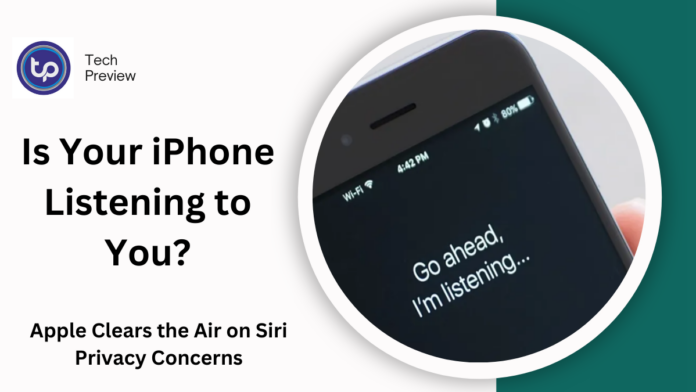Apple has always presented itself as a champion of user privacy, and the company recently doubled down on this claim amidst allegations that its Siri assistant secretly records conversations.
In a statement, Apple reiterated that data collected by Siri is never sold to advertisers or used to create marketing profiles. This declaration comes on the heels of a $95 million settlement in a class-action lawsuit accusing Siri of unauthorized recordings.
Here’s a detailed look at the issue, Apple’s response, and what it means for users.
What Were the Allegations?
The lawsuit alleged that Apple’s Siri assistant had eavesdropped on users without their knowledge or consent. Plaintiffs claimed that their private conversations were recorded and used to target them with ads.
For example, one plaintiff reported discussing Nike Air Jordans and soon after seeing ads for the product. This led to claims that Siri’s data collection practices violated user trust and privacy rights.
MUST READ: Is Apple Ready for a Foldable iPhone? Latest News and Speculations
Apple’s Response
Apple firmly denies these allegations and insists that Siri was designed to respect user privacy from the ground up. Key points in Apple’s defense include:
- No data sales: Siri data has never been sold to third parties or used for targeted advertising.
- On-device processing: Many Siri tasks are processed directly on the device to limit the need for data transmission.
- Temporary storage: When data is sent to Apple servers, it is anonymized and assigned a random identifier, not linked to an Apple ID. The data is disassociated after six months and deleted entirely after two years.
Apple settled the lawsuit to avoid prolonged legal battles but denied any wrongdoing. The company claims the allegations were based on outdated concerns that had already been addressed.
How Siri Collects and Uses Data
Apple emphasizes that Siri data collection is minimal and transparent. Here’s a breakdown of how Siri handles user data:
| Aspect | Details |
| On-Device Processing | Siri handles many tasks locally, minimizing the need for data transmission to Apple servers. |
| Anonymization | Data sent to Apple is anonymized and linked to a random identifier, not your Apple ID. |
| Limited Retention | Siri data is kept for six months and fully deleted within two years unless users opt in to share. |
If users opt in to the “Improve Siri” feature, audio recordings may be stored for quality enhancement. However, this feature is optional and disabled by default.
Steps to Manage Siri Data
If you’re concerned about Siri’s data collection practices, Apple provides several ways to manage or disable the assistant entirely:
- Turn Off Siri
- Open the Settings app.
- Navigate to Apple Intelligence & Siri > Talk & Type to Siri.
- Toggle Off all Siri-related options.
- Delete Siri Data
- Go to Settings > Siri & Dictation History.
- Tap Delete Siri & Dictation History to remove any stored transcripts.
- Opt Out of Siri Improvements
- Ensure the Improve Siri & Dictation feature is disabled in Settings to prevent Apple from storing audio recordings.
Apple’s Commitment to Privacy
Apple has built its brand around privacy and security, offering tools and features that prioritize user data protection. Unlike some competitors, Apple avoids monetizing user data and instead focuses on delivering services that work seamlessly without compromising privacy. Key elements of its privacy-first approach include:
- On-device AI: Apple employs advanced machine learning to process as much data as possible locally, keeping sensitive information on the user’s device.
- Transparency: Apple’s privacy terms are designed to clearly explain what data is collected and how it is used.
- User Control: Features like App Tracking Transparency give users the ability to opt out of data sharing across apps.
Why Did Apple Settle the Lawsuit?
Although Apple denies the allegations, the company agreed to a $95 million settlement. This decision was made to avoid the costs and distractions of prolonged litigation. Apple stated that the claims related to third-party grading were addressed in 2019 when the company stopped using contractors to grade Siri recordings.
Privacy Features That Protect Users
Apple has implemented several privacy-focused tools to give users control over their data and ensure their information is protected.
| Feature | Purpose |
| App Tracking Transparency | Lets users block apps from tracking their activity across other apps. |
| On-Device Processing | Ensures data is processed locally to reduce reliance on servers. |
| Privacy Dashboard | Shows how apps use permissions like location and camera access. |
These features highlight Apple’s effort to differentiate itself from competitors that rely heavily on user data for advertising.
Conclusion
Apple’s handling of the Siri controversy demonstrates its commitment to maintaining user trust and upholding privacy. While the lawsuit settlement may raise eyebrows, Apple’s actions reaffirm that Siri data is not used for ads or sold to third parties. With tools to manage and delete Siri data, users are empowered to control their privacy and use Siri with confidence.
People May Ask
1. Does Siri listen to all my conversations?
No, Siri only activates when you say the wake phrase (“Hey Siri”) or manually enable it.
No, Apple has stated that Siri data is not sold to advertisers or used for targeted marketing.
3. How can I delete Siri’s stored data?
To delete Siri’s stored data, go to Settings > Siri & Dictation History, then select Delete History.
4. Can I disable Siri completely?
Yes, you can turn off Siri entirely. Open the Settings app, navigate to Talk & Type to Siri, and toggle off all Siri options.
Click here to learn more.








